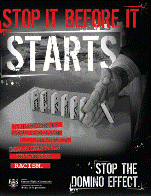2008: Celebrating the 60th Anniversary of the Universal Declaration of Human Rights
Universal Declaration of Human Rights: Introduction
Sixty years ago, nations of the world joined together in recognizing that all peoples, in all nations, are free and equal regardless of race, religion, economic status, age, gender or other personal characteristics. Through the signing of the Universal Declaration of Human Rights in 1948, the United Nations brought into being the first international document recognizing human rights as the foundation of peace, justice and freedom in the world.

The Universal Declaration outlines 30 basic rights essential for all human beings to achieve their full potential and to live a life free of fear and want. It was a unique approach that developed from the world saying 'never again' to the horrific events of World War Two, a war that brought a scale of atrocity never previously witnessed. The global death count is estimated to have been more than 50 million. War crimes were widespread: from the infamous Holocaust in which Nazi Germany sought to eliminate 'undesirables' such as Jews, Poles, Slavs, Roma, Sinti, the mentally and physically disabled, homosexuals and other persons, to the use of sex slaves, otherwise known as 'comfort women', by Japanese soldiers. Labour camps were used throughout the world and, disturbingly, World War Two brought the first testing of biological warfare by Japan and the use of atomic bombs in Nagasaki and Hiroshima by the United States of America. Read more...
Racism

The plurality of races, cultures, languages and religions brings a unique and diverse tapestry to Canada, enriching our communities. While this presence of differing cultures and ethnic backgrounds brings with it various perspectives, traditions and experiences, it also raises challenges. When racialized people face daily barriers of discrimination, it makes it difficult for them to be fully included and engaged in the society. Discrimination in employment and education, for example, creates barriers, making it more difficult for people to achieve basic human rights and the quality of life they deserve. For instance, poverty and homelessness are over represented within the immigrant, refugee and Aboriginal communities. One example of this is the high number of Aboriginal homeless women; 36 percent higher than the non-Aboriginal population.
According to the United Nations Convention on the Elimination of All Forms of Racial Discrimination:
The term "racial discrimination" shall mean any distinction, exclusion, restriction or preference based on race, colour, descent, or national or ethnic origin which has the purpose or effect of nullifying or impairing the recognition, enjoyment or exercise, on an equal footing, of human rights and fundamental freedoms in the political, economic, social, cultural or any other field of public life.
The Universal Declaration was based on the realization that it was racism that brought about the horrific events of World War Two. Consequently, the Declaration enshrined protection against racial discrimination as a fundamental principle. Yet today, racism continues to be evident throughout the world. In a post 9/11 atmosphere, peoples of certain backgrounds and faiths are unjustifiably feared. Current hate crimes in Canada include, hate graffiti on Jewish synagogues and Aboriginal centres; racial profiling of Muslims and other minority groups; white supremacist activities in some communities.
Racism doesn't have to be overt racial jokes, slurs or hate crimes. It can also be subtle. Racism of all types is based on a belief that one group is inherently superior to others. It can become deeply rooted in our systems and institutions, unfairly giving power and privilege to dominant groups and disadvantaging those who do not share the characteristics of those groups. Many of our urban schools, for example, have classrooms that reflect a multiplicity of backgrounds, yet, the teaching and administrative staff are primarily of the dominant background. Why do you think that is? And what can we do change it?
Canada has sought to address racial discrimination in a number of ways. The Charter of Rights and Freedoms guarantees everyone's rights to "…equal protection and equal benefit of the law without discrimination…based on race, national or ethnic origin, colour, religion" and other personal characteristics. Human rights legislation federally and in all provinces and territories makes it illegal to discriminate or harass someone because of their race, colour, ancestry, ethnic origin, religion and other grounds.
In 2004, the Government created Canada's Action Plan Against Racism, a federal initiative to address the problem of racial discrimination. More recently, the Canadian Commission for UNESCO has established the Canadian Coalition for Municipalities against Racism and Discrimination (CMARD). This initiative calls on local governments to work with communities to develop a plan of action to tackle racism and discrimination at the community level.
Individuals can take action against racism and racial discrimination, by taking the opportunity to know and appreciate people from other cultures and backgrounds. This will open doors to new relationships and opportunities, and give insight into different ways of thinking and acting. Diversity adds value to our society. We are each unique and we all have the potential to contribute positively to our communities. Help stop government. In a recent poll by Ipsos Reid, 82 percent of respondents believe multiculturalism in Canada is a positive thing; it can continue to be positive if we all choose to embrace and accept it.
Learn More! Get Involved!
- Department of Canadian Heritage, Government of Canada
- Canada's Action Plan Against Racism
- Canadian Coalition of Municipalities Against Racism and Discrimination
- Alberta Human Rights and Citizenship Commission
- Canadian Race Relations Foundation
- Equality Rights
- National Anti-Racism Council of Canada
- Northern Alberta Alliance on Race Relations
- Ontario Human Rights Commission
Related International Human Rights Documents
- Convention on the Elimination of All Forms of Racial Discrimination, 1966
- International Convention on the Suppression and Punishment of the Crime of Apartheid, 1973
- UNESCO Declaration on Race and Racial Prejudice, 1978
- Universal Declaration on Cultural Diversity, 2001
- World Conference against Racism, Racial Discrimination, Xenophobia and Related Intolerance, 2001 (Durban Declaration and Programme of Action)



